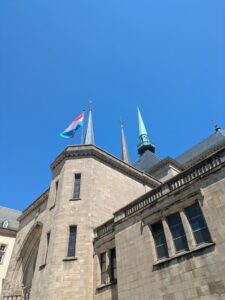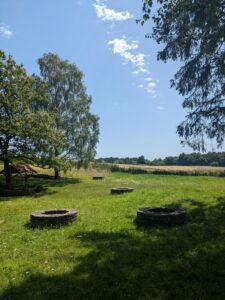We arrived early in Luxembourg after a short Ryanair flight from Porto, where we joined a crowd of returning Luxembourg nationals and Portuguese residents. Over the past several decades, Luxembourg has seen significant immigration from Portugal, and today, around 16% of Luxembourg’s residents are Portuguese—a blend that gives the city a uniquely multicultural feel. It was barely morning as we made our way through the terminal, and soon we found ourselves in the cool dawn air of Luxembourg City, ready to explore.
The city was quiet, with only the hum of trams and the sound of early commuters setting out for the day. We wandered briefly, looking for a place to grab coffee before we dove in deeper. Our search led us to the business district, where we found a café filled with mostly early risers, suited up and glued to their phones. The tall, modern office buildings stood in contrast to the old stone structures we’d soon explore, and the faint sounds of conversation in French, German, and Luxembourgish reminded us how many cultures intersect in this small city. After a quick espresso, we were ready to get moving, so we rented e-bikes to navigate Luxembourg’s winding streets and leafy parks.
Riding through the city, we admired the organized streets and clean, minimalist architecture, dotted with green spaces and bordered by the old city walls. The walls, which are a UNESCO World Heritage site, were incredible to see up close. With the e-bikes, we could move easily along the narrow lanes and take in the sweeping views of the valleys below. The fortifications, built hundreds of years ago, were shaded with thick stone, and we took in their muted greys and faded beige hues, blending into the cityscape. The Alzette River glistened far below, winding quietly through the city.
By the time we needed a break, the sun was high and warming up the streets. We found a small bar, tucked away and somewhat quiet, with only a few tables occupied by older men talking quietly. There was a noticeable shift in energy here compared to Iberia, where café conversations tend to be lively and louder. We ordered beers and took in our surroundings. This was clearly a finance hub—the buildings looming in the distance and the quiet professionalism all around were far from the easygoing vibe we’d left behind in Porto. Conversations were subdued, and people seemed more private, absorbed in their own worlds. It was a distinct cultural change from the vibrant, bustling energy we were used to, yet Luxembourg’s calm had its own appeal.
Notably Luxembourg’s soundscape is marked more by what you don’t hear than by what you do. It’s a place where the sounds blend into a soft, unobtrusive background rather than competing for attention. Unlike the lively bustle of southern European cities, where laughter, voices, and street performers fill the air, Luxembourg’s atmosphere is gentler, shaped by subtleties. It definitely felt more like home as we edged further north. 
Later, as the day turned toward evening, we headed out of the city to Petange and Niederkorn, where we were staying with Laura’s friend. Their family home was a beautiful structure, built in a style that immediately felt familiar, like the Swiss homes my (Ben) relatives live in, with sturdy wooden beams, warm, inviting rooms, and neatly kept gardens. The colors around us were earthy, with tones of dark wood and green from the plants all around. The smell of the countryside mixed with the lingering warmth of the day made it feel welcoming. Luxembourg’s countryside is known for its rich natural beauty, and this small, charming home nestled within it felt like the perfect spot to stay.
The next morning, we woke up to a bright and clear day. Stepping outside, we found figs ripe for the picking on a tree in the yard, and the morning air was crisp and slightly sweet. The fig tree’s branches swayed gently in the breeze, and we felt lucky to be here. After breakfast, we set out for Le Titelberg, an ancient Roman site near the town, surrounded by fields of wheat. Walking among the ruins, we were struck by the juxtaposition of the crumbling stone walls against the soft green hills and open skies. The wind picked up as we walked along, rustling through the wheat and creating a subtle background symphony that gave the place a sense of timelessness.

Just before our departure, Laura’s friend Rob shared with us some of his thoughts on life in Luxembourg, especially as a resident without citizenship. He told us how obtaining Luxembourg citizenship can be challenging and that many residents, even those with deep roots in the country, face difficulties in navigating the complex rules. His reflections added depth to our experience here, highlighting how Luxembourg’s multicultural identity is a strength, though not without its political complexities.
As we boarded the bus to Brussels, we thought about the kindness we’d encountered throughout our short stay. The free public transport, the family welcoming us into their home, and the open countryside had left us with a sense of calm and appreciation for Luxembourg’s quiet beauty. It’s a place where history and modernity meet, where cultures converge yet keep their unique identities, and where even a brief visit offers rich experiences. The bus rumbled along as we watched the green fields fade into the distance, and with them, the memories of a city as charming as it is reserved.


